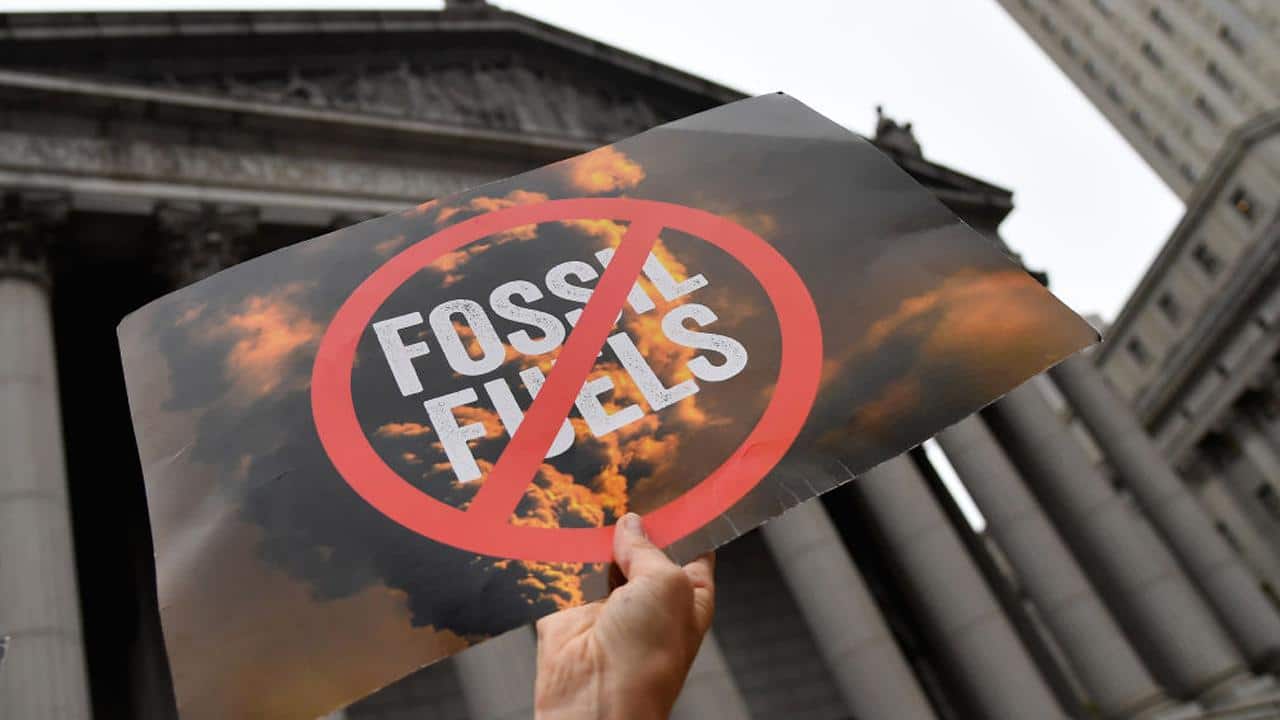
Top Ad and PR Firms Exposed for Helping Big Oil Greenwash Their Climate Destruction

Climate activists protest on the fist day of the ExxonMobil trial outside the New York State Supreme Court building on Oct. 22, 2019 in New York City. Angela Weiss / AFP / Getty Images
On the heels of congressional Democrats calling the heads of fossil fuel companies and industry lobbying groups to testify about their role in spreading climate disinformation, campaigners published a report Tuesday exposing the contributions of major advertising and public relations firms.
The aim of Clean Creatives’ report, as its introduction explains, was to “document the many known relationships between PR, advertising, and other creative agencies and fossil fuel companies that are responsible for climate change, and compare holding company pledges for climate action with their work for polluting clients.”
Unveiled last year by the nonprofit Fossil Free Media, the Clean Creatives campaign pressures ad and PR agencies to ditch clients fueling the climate emergency.
“Fossil fuel companies are the biggest polluters, the biggest greenwashers, and the biggest opponents of life-saving climate action. There is no room for ad and PR professionals to continue promoting companies that are doing so much damage to our future,” said Clean Creatives director Duncan Meisel in a statement about the report, entitled The F-List 2021The F-List 2021.
“The most important step any agency can take to address the climate crisis is to rule out working with fossil fuel companies,” Meisel added. “We need creatives and communications experts to bring their full energy towards ending this crisis, not extending it.”
The report focuses on the work of 90 agencies across three different regions—Australia, Europe, and North America—and notes that “fossil fuel industry clients include the full range of corporations involved in the business of extracting, transporting, refining, and selling fossil fuels, their trade associations, and front groups representing their interests.”
In the United States, the fossil fuel companies have “expanded their efforts to oppose and water down major climate legislation under the Biden administration,” the report says. In Europe, they face a “stricter regulatory environment targeting their products, and a tightening space for their advertisements,” but “these measures have not stopped fossil interests—both in the business of extraction, and power generation—from attacking major proposals for climate action.”
In Australia, one of the world’s top exporters of gas and coal, “the influence of fossil fuel companies goes all the way to the top,” the report points out, “with Prime Minister Scott Morrison famously brandishing a lump of coal in parliament and holidaying in Hawaii as the country faced catastrophic bushfires.”
Belinda Noble, founder of Comms Declare, which co-authored the report, explained that “Australia is unique because three prime ministers have lost their jobs for trying to limit greenhouse gases.”
“With corporate giants continuing to pump tens of millions into sponsorships, PR, lobbying, and marketing every year,” she added, “it’s no wonder Australia has no net-zero commitment and is playing a wrecking role in international climate negotiations.”
Let's start with @WPP.
— Clean Creatives (@cleancreatives) September 21, 2021
They just released a new sustainability plan to cut their own emissions to net zero by 2030, but their agencies hold dozens of contracts with major polluters that plan to increase their emissions in that same timeframe.
The concept of net-zero emissions “has rapidly proliferated through corporate communications” since the Paris agreement was signed in 2015, and “the term has taken on even greater importance” going into this year’s COP 26 summit in Glasgow, Scotland, the report notes.
Defining what “net-zero” is and isn’t “will need to be a central focus of advertising and PR trade associations, regulators, and internal ethics watchdogs for agencies with fossil fuel clients,” the report says, warning of how it could be used for “a growing number of fossil fuel PR and ad campaigns, in a large and widespread greenwashing effort towards the end of 2021.”
The report features a chart showing which firms serve which fossil fuel clients, noting when an ad or PR agency is tied to a holding company. It also highlights conflicts between the polluter clients and sustainability pledges of major holding companies—WPP, Interpublic, Dentsu, Publicis, and Omnicom.
There are also three case studies, detailing:
- Edelman’s work for ExxonMobil’s “Exxchange” platform;
- Project Cesar, “an operation created by the firm Crosby Textor to astroturf support for coal projects, and oppose measures to address climate change in Australia,” revealed by The Guardian in 2019; and
- the European Union’s greenwash of blue hydrogen.
“Exxon has become one of the top spenders on climate issues on Facebook, frequently sharing misleading statistics about proposed climate action, and encouraging users to ‘take action’ to stop them on their website Exxon Exxchange,” the report says, highlighting the key role of social media giants in the dissemination of climate disinformation.
ExxonMobil has faced heightened scrutiny for its efforts to influence U.S. politics in the wake of an exposé published earlier this summer. CEO Darren Woods is among those invited to appear before the U.S. House Oversight and Reform Committee next month for a hearing reminiscent of the 1990s congressional investigations into Big Tobacco.
If Woods—along with BP America CEO David Lawler, Chevron CEO Michael Wirth, Shell president Gretchen Watkins, American Petroleum Institute (API) president Mike Sommers, and U.S. Chamber of Commerce president and CEO Suzanne Clark—refuse to testify or turn over materials to the House panel, Democrats may issue subpoenas.
Reposted with permission from Common Dreams.
- Big Oil's 'Wokewashing' Is the New Climate Science Denialism ...
- Apple, Amazon, Microsoft, Disney Among Major Corporations Lying About Supporting Climate Action - EcoWatch
- A Guide to Greenwashing and How to Spot It - EcoWatch

 233k
233k  41k
41k  Subscribe
Subscribe 